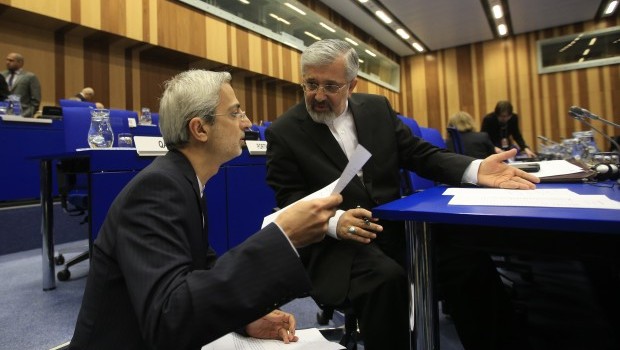
Iran’s envoy to the International Atomic Energy Agency (IAEA) Ali Asghar Soltanieh (R) discusses with a member of the Iranian delegation during the Board of Governors meeting at the UN atomic agency headquarters in Vienna, Austria on March 6, 2013. (ALEXANDER KLEIN/AFP/Getty Images)
President Barack Obama’s reelection brought new hope to the possibility of reaching a peaceful solution to the Iranian nuclear crisis. Secretary of State John Kerry has repeatedly asserted the United States’ willingness to return to the negotiating table, but only if Iran is serious about the nuclear talks. Iran has always been eager to return to the negotiating table, especially if negotiations have been for negotiation’s sake alone—endless rounds of previous talks have bought the Iranian regime time to enrich. But for the world, time is running out.
After years of negotiations, the international community is concerned about Iran’s intentions. Is Iran pursuing a meaningful resolution to the nuclear issue, or is the leadership in Tehran using negotiations as a ploy to kill time, and move towards weaponization? As another round of futile negotiations were held in Almaty, Kazakhstan, the international community’s continuous economic sanctions and pressure on Iran can demonstrate the world’s determination to prevent a nuclear armed Iran while chipping away from the regime’s base, some of whom have benefited greatly from regime handouts.
Iran’s leadership is not yet willing to make meaningful and permanent concessions to the West on its nuclear program. Supreme Leader Khamenei, the man at the top of Iran’s political pyramid, has asserted numerous times that the Iranian nuclear program was an “absolute right” and that his regime was going to stay the course until it reached “full nuclear capability.” Khamenei said on March 7 that his negotiators should wait until yet another round of talks to evaluate the West’s “honesty” about their respect for this “absolute right.”
Despite Khamenei’s religious decrees banning the production and use of nuclear weapons, most observers believe that “full nuclear capability” means an Iranian regime with “breakout” capabilities—the ability to weaponize in a matter of weeks.
This past October, Khamenei asserted once again that the West had no interest in reaching a deal with Iran on its nuclear program and that his subordinates should not make any concessions to the West. Khamenei told a crowd of supporter in the province of Northern Khorasan that “They [the West] are saying that if the [Iranian] nation gives up on their rights to nuclear energy, then the sanctions will end. They are lying.” In the eyes of Iran’s most powerful man, Western sanctions were imposed out of “hatred and spite” for the Iranian people.
A month later in November, General Mohammad-Reza Naghdi, the commander of Iran’s feared Basij paramilitary forces and an intimate ally of the Supreme Leader, downplayed the impact of sanctions on the Iranian economy, and predicted with confidence that Iran was going to build a new “economic regime on the ashes of Western sanctions.” He went as far as daring the West to impose even tougher sanctions on Iran claiming “We [Iranians] have always made significant progress in areas under severe sanctions.” While Naghdi is regurgitating a blatant lie (that sanctions have helped and not hurt the Iranian economy), one thing is clear: Naghdi and his comrades are not going to budge and are preparing to weather the storm of sanctions.
Supreme Leader Ali Khamenei and his surrogates, all handpicked by him to lead Iran’s top military and security organizations, are convinced that the West is seeking to weaken Iran through sanctions, and this is why they have asked the regime faithful to “resist” Western pressure. But this resistance could very well jeopardize the survival of the regime. They fear that the cash–strapped Iranian government will no longer be capable of providing handsome payouts to its supporters, and would gradually lose their support. Their fears are justified: the Iranian currency has lost 75 percent of its value in the past year and unemployment has reached record highs. Inflation, according to official estimates by Iran’s Central Bank, is at a whopping 24 percent, though many observers believe that the true rate of inflation is much higher than that reported by the government. Many in Iran are beginning to question the government’s uncompromising position on the nuclear issue and blame the regime for the country’s economic ills.
Iran’s Minister of Industry and Trade Mehdi Ghazanfari said January 10 that “new sanctions have been paralyzing” and that the government should prepare the masses to “have certain expectations that we can meet.” Admitting the dangers of sanctions for the regime, IRGC General Naser Shabani, deputy commander of IRGC’s military academy, said January 14, “We presume that [future] unrest is going to begin in the provinces instead of in Tehran. It is possible that economic issues are very effective and the hardworking and vulnerable [the downtrodden] segment of society would participate in future problems [unrest], but we have the experience of how to confront this.”
The Iranian government is worried about its survival. For years, the government was able to count on the support of the so-called downtrodden against the disgruntled urban middle classes. Losing the rural and the downtrodden is what the regime fears most, and it is precisely what continuous sanctions would achieve.
The clock is ticking. Intensifying the current sanctions regime, paralyzing the Islamic Republic economically, and threatening the regime’s survival are the only viable options to guarantee Iran’s return to the negotiating table. Softening international pressure now, before Iran has made significant concessions on enrichment and nuclear site inspections, would provide ample opportunity for the regime in Tehran to enrich, while taking credit for cooperating with the international community on its nuclear program.
